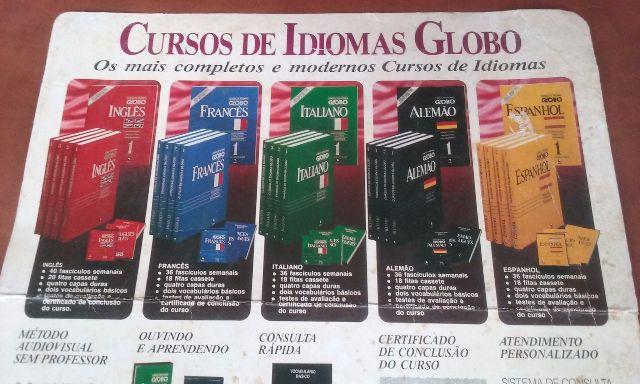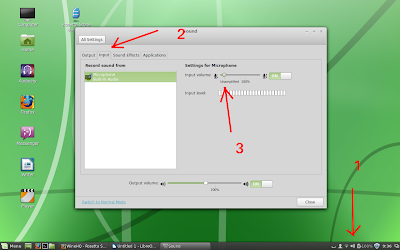Texto em Português mais abaixo.
Scroll down for text in Portuguese.
Dear readers,
This post does not correspond to the main objective of this blog, which is to relate my study progress with Rosetta Stone. But due to the importance of this information, I decided to post it here.
One of the main reasons for me to keep using Microsoft Windows and not a Linux distro was that I couldn't use Rosetta Stone on Linux. I mean, the installation of Rosetta Stone on Linux should be easy with Wine (a software to run Windows programs on Linux). You simply need to have Wine installed, execute Rosetta Stone application and then install the language you want. So far, so good.... but then there is always this microphone issue: most users simply cannot make the microphone work on RS installed in Linux.
Since the solution for that is so hard to find, I decided to post this tutorial here.
HOW TO MAKE MICROPHONE WORK FOR ROSETTA STONE IN LINUX
I tried this in two computers with different Linux distros and in both it worked: Linux Mint 16 in a laptop and Ubuntu 13.10 in a desktop. I use Rosetta Stone 3.4.5 in both. I guess this should work for other versions of both Linux and RS. I found this tutorial here, which is originally for Ubuntu.
Solution came with the following
settings:
1 – Install latest Wine 1.5.14
1 – Install latest Wine 1.5.14
Open the terminal and paste these
commands:
sudo add-apt-repository ppa:ubuntu-wine/ppa
sudo apt-get update
sudo apt-get install wine1.5
sudo add-apt-repository ppa:ubuntu-wine/ppa
sudo apt-get update
sudo apt-get install wine1.5
2 - Go to Configure Wine, in the tab 'libraries', enter 'winepulse.drv' in the box and click on add, click yes on the warning. Select winepulse.drv and change load order to 'disabled'.
3 - Try running Rosetta Stone and see if the problem was solved.
For me, two options of microphone
appeared, any will do.
SOLVING POSSIBLE PROBLEMS
Speech recognition doesn't work
This may be caused because the quality
of the microphone might be really bad inside Rosetta Stone under Wine
specifically. In my case it has a lot of interference and noise, so
the speech recognition did not work most of the time.
Solution: put the speech recognition
in ¨easy mode¨ in RS settings, and set the input volume close to
the minimum in Linux settings.
1 - Access "set preferences";
2 - Perhaps any microphone will do.
3 - Set to "easy".
4 - Apply changes.
1 - Click on the volume icon on the bottom
right of the Linux Mint screen or top right in Ubuntu.
2 - access sound settings > input.
3 - Set input volume close to the minimum.
The microphone option suddenly
disappears in Rosetta Stone
Another frustrating problem was that
sometimes when I opened Rosetta Stone, the microphone option was
there... and other times it was not. It simply vanished into thin
air. So I could just use the microphone if RS happened to recognize
it. I realized this bug was caused by other programs or windows that
were open on the background that might be ¨stealing¨ the
microphone. For example, if I don´t close the window for the Linux
sound settings, RS simply won´t see the microphone, like this:
Solution: close everything else before
running Rosetta Stone.
I realized the two
aforementioned problems in the computer running Linux Mint (perhaps
because the computer is real old). In the computer with Ubuntu,
Rosetta Stone ran smoothly.
TRANSFER YOUR PROGRESS FROM WINDOWS TO LINUX
If you have already been studying and don't want to lose all your progress report when you migrate to a new computer or system, all you need to do is to copy file tracking.db3 - that's where your progress is registered.
In Windows, this is the path:
C:\ProgramData\Rosetta Stone\tracking.db3
Folder ProgramData is hidden, so in order to view it, you need to access Control Panel > Folder Options > View > "Show hidden files, folders and drivers."
In Linux, you need to access "Browse C: Drive" > Users > Public > Application Data > Rosetta Stone
Find C: drive...
In Ubuntu
In Linux Mint (Menu > Wine > Browse C: Drive)
After finding file tracking.db3, delete it and substitute for the one that contains your progress.
TRANSFER YOUR PROGRESS FROM WINDOWS TO LINUX
If you have already been studying and don't want to lose all your progress report when you migrate to a new computer or system, all you need to do is to copy file tracking.db3 - that's where your progress is registered.
In Windows, this is the path:
C:\ProgramData\Rosetta Stone\tracking.db3
Folder ProgramData is hidden, so in order to view it, you need to access Control Panel > Folder Options > View > "Show hidden files, folders and drivers."
In Linux, you need to access "Browse C: Drive" > Users > Public > Application Data > Rosetta Stone
Find C: drive...
In Ubuntu
In Linux Mint (Menu > Wine > Browse C: Drive)
After finding file tracking.db3, delete it and substitute for the one that contains your progress.
Hope this is useful! Now study hard!
________________________________________________________________
Caros leitores,
Esta postagem foge um pouco do objetivo
do blog, que é simplesmente relatar meu progresso com o Rosetta
Stone. Mas devido à utilidade das informações, resolvi postar.
Um das principais razões
por que eu continuava usando o Microsoft Windows em vez de alguma
distribuição do Linux era que eu não conseguia usar o Rosetta
Stone no Linux. Na verdade a instalação do Rosetta Stone no Linux deve ser bem fácil com o Wine (um
software para rodar programas do Windows). Tudo o que você precisa é ter o Wine instalado, executar o aplicativo do Rosetta Stone e depois instalar o curso do idioma desejado. Até aí tudo bem... o problema é que a maioria dos usuários simplesmente não
consegue fazer o microfone funcionar no RS instalado no Linux.
Já que a solução é tão
difícil de encontrar, resolvi postar um tutorial aqui.
COMO
FAZER O MICROFONE FUNCIONAR COM O ROSETTA STONE NO LINUX
Tentei os procedimentos em dois computadores diferentes: um com o Linux Mint 16 e outro com o Ubuntu 13.10. Funcionou em ambos. Uso o Rosetta Stone 3.4.5. Acredito que os procedimentos devam
funcionar com outras versões do Linux e do RS. Encontrei este tutorial, que originalmente é para o Ubuntu.
A solução veio com as
seguintes configurações:
1 – Instale a última
versão do Wine 1.5.14
Abra o terminal e cole os
seguintes comandos:
sudo add-apt-repository
ppa:ubuntu-wine/ppa
sudo apt-get update
sudo apt-get install wine1.5
sudo apt-get update
sudo apt-get install wine1.5
2 – No menu, vá para
Wine > Configurar Wine> aba “bibliotecas¨ e digite
'winepulse.drv' na caixa e clique em adicionar, clique sim para o
aviso. Selecione winepulse.drv, editar e marque em ´desativar´.
3 – Tente rodar o
Rosetta Stone e veja se o problema foi resolvido.
Para mim, o programa
mostrou duas opções de microfone. Qualquer opção funciona.
RESOLVENDO POSSÍVEIS PROBLEMAS
O reconhecimento de voz
não funciona
Se isso acontecer, talvez
seja porque a qualidade do microfone pode estar bastante ruim dentro
do Rosetta Stone especificamente. No meu caso há muito ruído, de
forma que impede o reconhecimento de voz.
Solução: na configuração
do microfone no Rosetta Stone selecione o modo “fácil¨. Nas
configurações de som do Linux, ajuste o volume do microfone para
quase do mínimo. Siga as instruções:
1 - Acesse "preferências".2 - Qualquer microfone deve funcionar.
3 - Coloque em "fácil".
4 - Aplicar mudanças.
1 - Clique no ícone de volume no canto inferior
direito da tela do Linux Mint, ou superior direito no Ubuntu.
2 - Acesse Configurações de som > EntMain#Homerada.
3 - Coloque o volume quase no mínimo.
A opção de microfone desaparece do nada no Rosetta Stone
Um problema bastante
frustrante que tive é que às vezes quando eu abria o Rosetta Stone,
a opção de microfone estava lá... outras vezes não estava.
Simplesmente sumia do nada. Então eu só podia usar o microfone
quando o RS por acaso decidia reconhecê-lo. Eu descobri que esse bug
é causado por outros programas e janelas que ficam abertas em
segundo plano e podiam estar ¨roubando¨ o microfone. Por exemplo,
se eu não fechar a janela de configuração de som do Linux, o RS
simplesmente não vai ver o microfone, como mostra a figura:
Solução: feche tudo
antes de abrir o Rosetta Stone.
Esses dois problemas
apareceram no computador com o Linux Mint (talvez seja porque o
computador é bem mais velho). No computador com o Ubuntu, o Rosetta
Stone funcionou sem problemas.
TRANSFIRA SEU PROGRESSO DO WINDOWS PARA O LINUX
Se você já está estudando e não quer perder todo o registro do seu progresso quando migrar para outro computador ou sistema operacional, tudo o que precisa fazer é copiar o arquivo tracking.db3, pois é aí onde está guardado seu progresso.
No Windows, este é o caminho:
C:\ProgramData\Rosetta Stone\tracking.db3
TRANSFIRA SEU PROGRESSO DO WINDOWS PARA O LINUX
Se você já está estudando e não quer perder todo o registro do seu progresso quando migrar para outro computador ou sistema operacional, tudo o que precisa fazer é copiar o arquivo tracking.db3, pois é aí onde está guardado seu progresso.
No Windows, este é o caminho:
C:\ProgramData\Rosetta Stone\tracking.db3
A pasta ProgramData é oculta, para visualizá-la você precisa acessar o painel de controle, opções de pasta, aba "modo de exibição" e marcar "mostrar arquivos, pastas e unidades ocultas". Veja a imagem:
No Linux, você precisa acessar "Navegar no Disco C:" > Users > Public > Application Data > Rosetta Stone
Encontre o disco C:
No Ubuntu
No Mint (Menu > Wine > Navegar no Disco C:)
Após encontrar o arquivo tracking.db3, apague-o e substitua por aquele que contém seu progresso.
Espero que seja útil! Agora vamos estudar!














